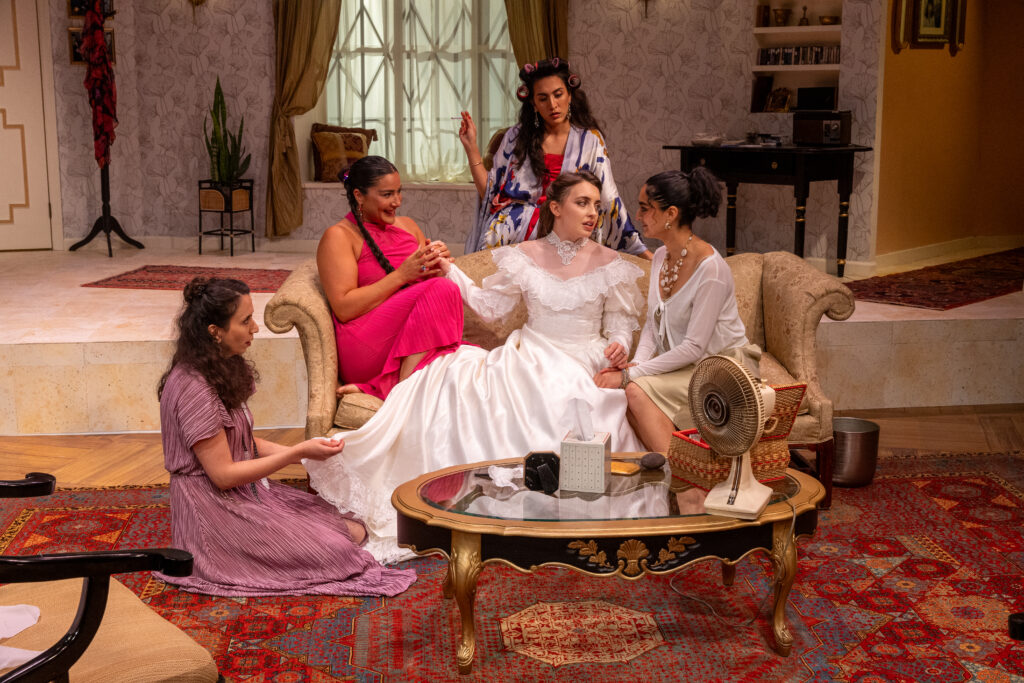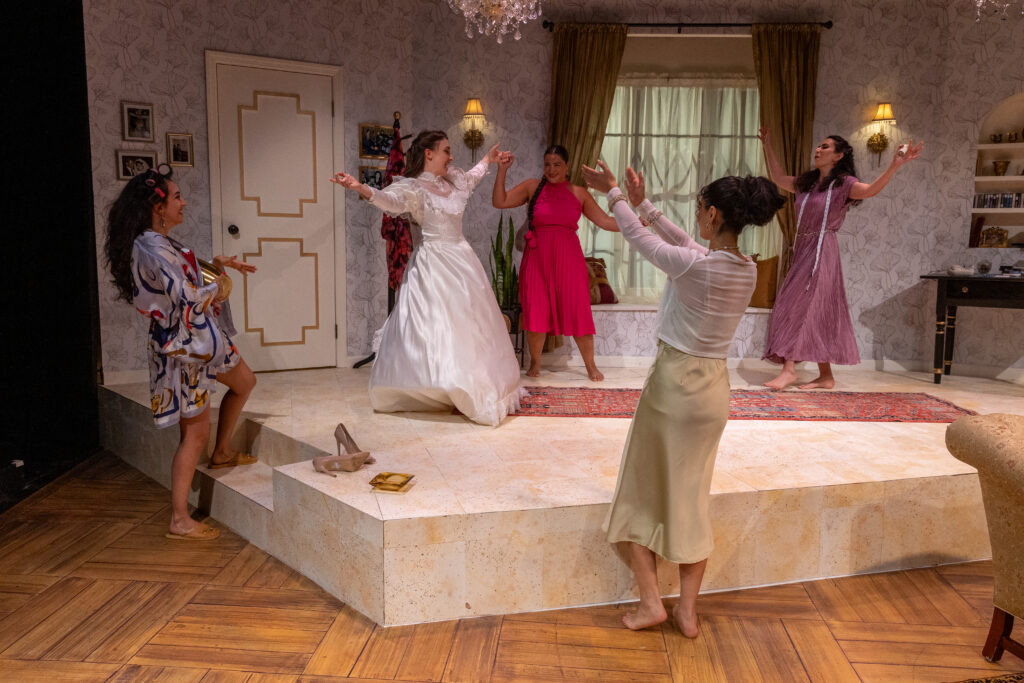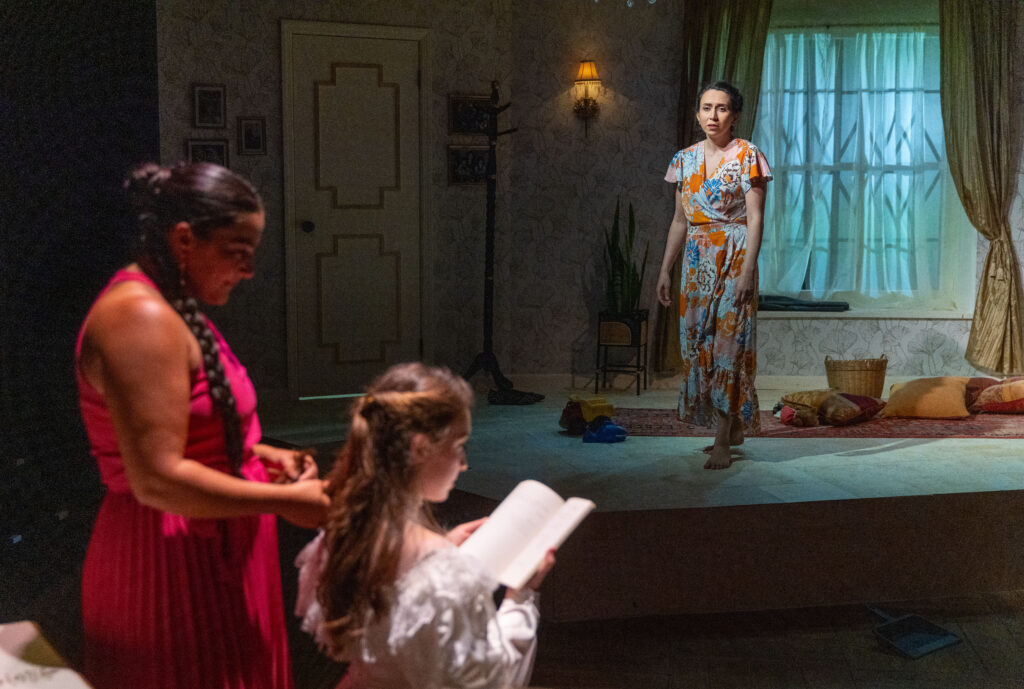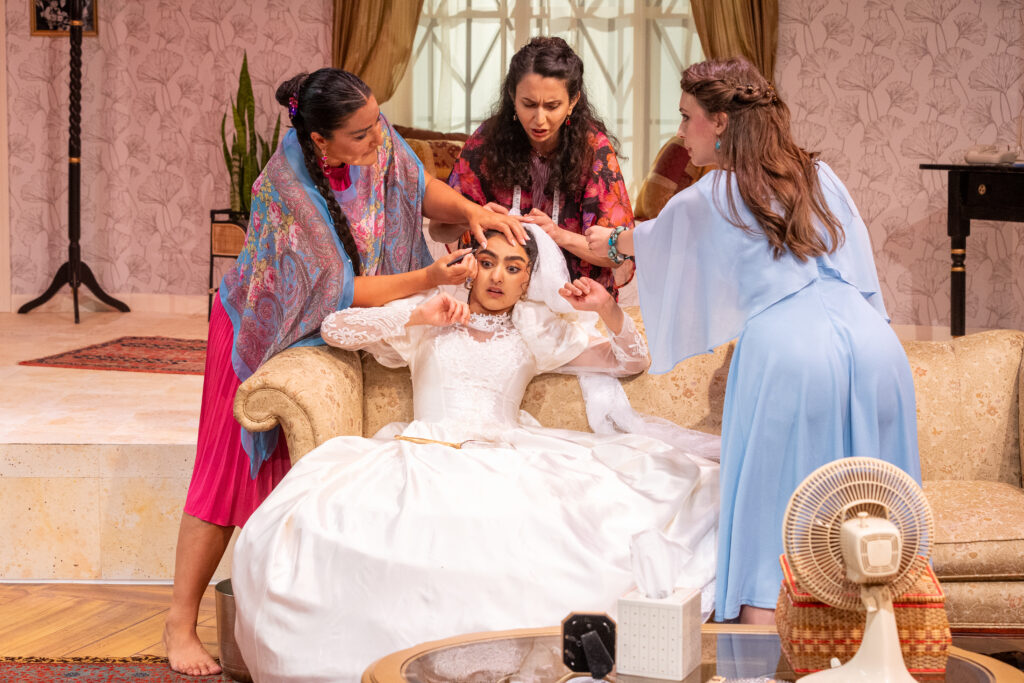
‘Wish You Were Here’ — Written by Sanaz Toossi. Directed by Melory Mirashafi. Scenic Design by Lindsay G. Fuori; Costume Design by KJ Gilmer; Lighting Design by Amanda Fallon; Composer and Sound Design by Bahar Royaee. At Gloucester Stage in Gloucester through August 25.
By Shelley A. Sackett
“Wish You Were Here,” in its regional premiere at Gloucester Stage, opens on three frozen tableaux set in a lavish apartment with Persian-inspired décor. At an ornate make-up table, two women hover over a third clad in a billowing wedding dress. Another, wearing a red silk short kimono and huge pink curlers, is draped over a couch, a cigarette dangling provocatively from her languid hand. A fifth slouches against the wall. All appear to be in their late teens/early 20s.
Suddenly, the three scenes simultaneously spring to life, all five women speaking to and over each other.
The friends have gathered to prepare for the wedding of Salme (Josephine Moshiri Elwood), the first among them to get married. She is the straightest, most religious and purest of the five. She prays faithfully and frequently on behalf of her friends, hoping their lives will be set on the path she deems is in their best interest.
The girls are chatty, animated, without a care in the world other than outwitting the wittiest and shocking the most prudish among them.
Shideh (Cerra Cardwell) neurotically frets over whether she will get into medical school. Nazarin (Deniz Khateri), a sullen eye roller, plans to become an engineer. She and best friend Rana (Aryana Asefirad), the kimono girl, vow never to marry and have children. Zari (Isan Salem), the youngest of the group, longs for sex. Vagina and large penis jokes are their favorites.
Although the setting is 1978 in Karaj, Iran, a city about 26 miles from Tehran, these five rambunctious friends could be straight out of the pajama party scene in “Grease.” They are silly, lewd and disarmingly intimate. They bicker and clown. They mock and soothe. They constantly touch each other and tease about sex and their bodies.

They paint each other’s nails, remove each other’s unwanted hair and perform the pre-wedding night olfactory “pussy audit.” Their favorite game is the telepathic “What am I thinking?” Through the boisterous banter and loving friction, their deep commitment to this quintet is unmistakable.
The atmosphere inside this posh apartment crackles with pop culture and the promise of youthful dreams of adventure, travel and sex. Although “there’s static in the air,” the girls are unconcerned about anything outside their snow globe existence. They hear the protests outside and are aware that the Shah has left, but blithely ignore the shape-shifting world around them.
Over the next 100 minutes, we will drop in on this living room and this group another 10 times, following them from 1978 until 1991. Mirroring the upheaval experienced by their country (from the Shah’s exile to the Islamic crackdown and revolution led by Khomeini to the American hostage crisis to the Iran-Iraq War), these five will face marriage, loss, the impact of misogynist religious zealotry and the torment of dreams snuffed out.
The first intrusion of the outside world into their cocoon comes the next year.
Before the Shah’s exile, Jews lived safely beside their Muslim fellow Iranians, flourishing and blending in. Muslims and Jews lived side by side, and religious freedom was a nonissue. Affluence and status mattered much more. With the Islamic Revolution, all that changed.
When we encounter the group for the next wedding (1979), there is turmoil in the streets. The Shah is out, and Khomeini is in. This turbulence directly affects our friends when Rana, the “cool Jewish girl and Nazanin’s best friend,” and her entire family go missing. Dishes were left in the sink, and there was no sign of a struggle. No one has seen or heard from them since.
Each girl deals with this loss in telling and different ways.

“She’s fine,” Nazanin says, although, as another points out, “A whole family of Jews missing is usually not a good sign.” Only Salme tries to find her through prayer and the internet. Later, in Act II, one wonders, “Where do we all go when there is no one trying to locate us?” a recurrent rhetorical and thematic thread.
By the third wedding, there may be Bee Gees disco in the background, but the internal atmosphere of the apartment has been infiltrated. The radio crackles with static, but when it is clear, Nazanin is nearby, hoping to hear a word about what is going on outside their doors.
As religious piety and intolerance increasingly rule the land, the group dwindles further. Salme embraces religion and prayer but meets an untimely death when she drowns while swimming in her burka. Shideh takes the opposite path, fleeing to the United States to study medicine. Nazarin and Zari, who never really cared for each other, are the sole sorority sisters.
“Do you love me because I’m the only one left?” Zari asks when they rekindle their friendship. They bond out of desperation and loneliness, vowing to remain in Iran and feed the flames of their newfound friendship. Yet Zari applies for a green card “just to be safe” and Nazarin is caught up in the torment of disappointment and confusion.
She disdains prayer, but believes in its power. She wonders every day how her life might have turned out had she been able to become an engineer had the winds of politics been blowing in her favor. She desperately misses Rana, yet never tried to find her. She swore she would settle for no less than true love, yet admits on her wedding day that she doesn’t love the man she is about to marry.
Iran, her homeland, is a dead end for everything that matters to her, yet she steadfastly refuses Zari’s offer to get her a green card. “Why,” she wonders aloud, “don’t I want to leave?”
When Rana finally gets in touch, 10 years after leaving, Nazanin and she pick up exactly where they left off. “Are you still a Muslim?” Rana asks. “Are you still a Jew?” Nazanin fires back, not missing a beat.
After five years in Israel, Rana now lives in California and works in a Pizza Hut. Suburban America may be spiritually lifeless, but she will never return to Iran. Instead of turmoil, revolution, persecution and flight, her children will know only one home, one that can’t inflict the kind of heartbreak and devastation she suffered.
Toossi revisits many of the same themes of emigration, national identity, home and displacement she so brilliantly tackled in her Pulitzer Prize winner, “English.” “Who do you think of when you think of where you’re from?” she asks through her characters. Who defines you? Where do you find your home? Is it a place? The people? Shared experiences? Where you grew up or where you live now?
Unfortunately, “Wish You Were Here” misses the high mark set by “English.” Toossi doesn’t flesh out these girls’ backgrounds and individualities; they lack nuance and depth. They live in an impenetrable bubble, teetering on a tipping point, and we have a hard time caring.
Director Mirashrafi does the best she can with a script that compresses 13 years into 100 minutes and 10 scenes that are confusing because they give too little context about the raging Iranian politics. There is a Dramaturgy & Timeline in the Playbill (which is most helpful if read BEFORE the play starts), but that doesn’t take the place of timeline references within the script, especially where the play is meant to cover so much ground in such a short time.
Sometimes it was impossible to tell that a new scene in a new year had started until it was almost over. It was also often impossible to tell who was who, especially at the very beginning when each girl seemed to be shouting, the pace was a little too quick and the girls’ names were indecipherable.

Nonetheless, it’s always a pleasure to attend a performance that may take several days of percolating before its impact bubbles up. In addition to the timely issues she raises, American-Iranian Toossi provides a compassionate multi-layered glimpse of Iranian society. Several scenes, although they also present speed bumps in the drama’s flow, are poignant reminders of the beauty and mystery at the heart of Islam.
There are joyful elements of traditional music, dress, and custom. The full silence during Salme’s long prayer scene lets the audience (and the less observant and devoted girls) through the keyhole of the sweet, nourishing elements of a religion that has been hijacked and weaponized by militant male power grabbers determined to dominate women and infidels.
It’s too bad Toossi didn’t spend more time exploring this element, as well as giving her characters a third dimension. Who knows? That might have elevated this play to the level we know she has the chops to write. For more information, go to https://gloucesterstage.com/

